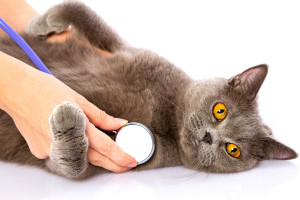 Wellness exams are specific to each pet that comes to see our team. To begin, every patient will be weighed before their evaluation by a technical staff member and any questions or concerns you may have should be directed to that staff member so they can advise the doctor of your concerns.
Wellness exams are specific to each pet that comes to see our team. To begin, every patient will be weighed before their evaluation by a technical staff member and any questions or concerns you may have should be directed to that staff member so they can advise the doctor of your concerns.
Every exam includes a nose to tail check of every body system. We start with eyes, ears, nose and mouth move on to the heart and lung and finish with the abdomen and yup, the rear end. Included in our wellness exam we note items like lumps, bumps, and skin and coat concerns. After the exam we will talk about our findings and then the recommendations for your pet.
We know that pets can have “no touch me” zones and we respect that and approaches to those zones are modified, when we can, to make the visit much less stressful. Wellness exams happen very frequently with puppies and kittens, (usually every 3 to 4 weeks, starting at 6 weeks of age), until the final vaccinations are performed, at about 16 to 20 weeks of age. Adult animals aging from 8 months to 5 years old are generally seen on an annual, (once a year), basis. Again lifestyle and breed predispositions play a part in needing to examine an adult animal more than once a year. As our pets push past the 5 year old mark they may be entering into the senior group and need wellness evaluations every 6 months or more.
Senior Pet Wellness
We have different concerns when it comes to our senior pets. Senior pets can be more prone to diseases, and with how quickly pets age it actually quickens the disease progression. The age at which a pet is considered a senior can vary between dog and cat, and even weight and breed. A cat usually is considered a senior at the age of 8-10, where as a dog would be considered a senior as early as 6 if they are a giant or large breed dog, and a small or medium sized dog would be a senior at the age of 7-9.
We recommend a wellness visit twice a year for our senior pets. At these appointments we will be on the lookout for behavioral, physical, and social changes in the pet. These changes could be a quick onset or a gradual one. So warnings signs to look for would be: Your pet no longer greets you at the door, they shy away from family and being petted, attitude changes (snaps or growls), seems lost and confused (can’t find the door), excessive panting, barking in a situation they never barked in before, shaking or trembling, dull hair coat, changes in skin, excessive weight gain or loss, sleeping more, slow or stiff when getting up, doesn’t want to play and of course other areas of concern with an older pet vomiting/diarrhea or changes in appetite.
Even if you aren’t noticing any signs of being sick or any of the items listed above, we do recommend base line blood work done so that way we can monitor values that cannot be visually noted. The benefit of doing these blood tests is to find a problem early, and when we find a problem early we can treat it early which in turn you will give your pet a healthier, longer life with you. We find that many diseases are silent and only show changes when the disease is more advanced.

Recent Comments